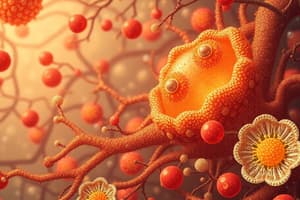Podcast
Questions and Answers
What is the function of the Golgi Apparatus within a cell?
What is the function of the Golgi Apparatus within a cell?
Which organelle is known as the cell's powerhouses for producing energy in the form of ATP?
Which organelle is known as the cell's powerhouses for producing energy in the form of ATP?
What is the main function of the Endoplasmic Reticulum (ER) within a cell?
What is the main function of the Endoplasmic Reticulum (ER) within a cell?
Which organelle serves as the barrier between a cell's interior and exterior, controlling what enters and exits the cell?
Which organelle serves as the barrier between a cell's interior and exterior, controlling what enters and exits the cell?
Signup and view all the answers
What is the main function of ribosomes in the cell?
What is the main function of ribosomes in the cell?
Signup and view all the answers
How do cells communicate with each other and their environment?
How do cells communicate with each other and their environment?
Signup and view all the answers
What is the purpose of apoptosis in cells?
What is the purpose of apoptosis in cells?
Signup and view all the answers
Which phase of the cell cycle involves the duplication of genetic material?
Which phase of the cell cycle involves the duplication of genetic material?
Signup and view all the answers
What do cell biologists primarily investigate?
What do cell biologists primarily investigate?
Signup and view all the answers
Which cellular process leads to the creation of genetically identical daughter cells?
Which cellular process leads to the creation of genetically identical daughter cells?
Signup and view all the answers
Study Notes
Unlocking Cells: Exploring the Breathtaking World of Cell Biology
Cell biology is a fascinating field of research that explores the inner workings of the smallest units of life—cells. These minuscule entities are responsible for everything from growth and reproduction to metabolism and communication. To understand the complexities of cell biology, let's dive deep into the world of cells.
The Building Blocks of Life
Cells come in many shapes and sizes, but they all share a common structure. They consist of a membrane, cytoplasm, and an array of organelles with specific functions. The nucleus, containing genetic instructions, is one such organelle. Cell membranes, made of lipids and proteins, serve as the barrier between the cell's interior and exterior, and they also control what enters and exits the cell.
Organelles: Cellular Powerhouses
Cells are filled with specialized structures called organelles, each with its unique function. Some of the most important ones include:
- Mitochondria: These are the cell's powerhouses, responsible for producing energy in the form of ATP.
- Endoplasmic Reticulum (ER): An extensive network of membranes involved in protein synthesis and folding.
- Golgi Apparatus: A compartment where proteins and lipids are packaged and prepared for export from the cell.
- Lysosomes: Intracellular garbage disposals that break down and recycle cellular components.
- Ribosomes: Protein-producing factories that translate genetic information from the nucleus into specific proteins.
Cellular Communication and Signaling
Cells communicate with each other and their environment through a variety of signaling pathways. These pathways involve the release of chemical messengers, such as hormones and neurotransmitters, which activate specific receptors on the cell surface. This communication allows cells to coordinate their activities, respond to changes in their environment, and maintain homeostasis.
The Cell Cycle and Cell Division
Cells divide and reproduce to ensure the continuation of life. The cell cycle consists of four main stages: prophase, metaphase, anaphase, and telophase. During these stages, the cell duplicates its genetic material, organelles, and other cellular components, ultimately resulting in two genetically identical daughter cells.
Cell Death and Apoptosis
Cells don't live forever; they're programmed to die at specific times, a process called apoptosis. Apoptosis is a carefully regulated process that removes damaged or unwanted cells and helps to maintain cellular homeostasis.
Cell Biology: A Rewarding Field
Today's cell biologists tackle many pressing questions in medicine, biology, and other fields. They investigate the causes of disease, the nature of aging, and the development of new treatments. Their work has led to significant advances in our understanding of the human body and its functioning.
As you can see, cell biology is an exciting and ever-evolving field that continues to uncover the mysteries of life at the cellular level. The quest to understand the inner workings of cells has led to some of the most important discoveries in science and medicine, and it promises to reveal even more secrets in the future.
[Note: This article does not include references, as indicated in the instructions.]
Studying That Suits You
Use AI to generate personalized quizzes and flashcards to suit your learning preferences.
Description
Test your knowledge of cell biology with this quiz that delves into cell structure, organelles, cellular communication, cell division, apoptosis, and the rewarding field of cell biology. Explore the fascinating world of cells and their inner workings.




